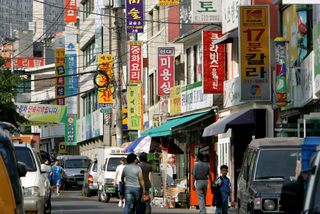Posted on : Jun.26,2006 09:49 KST
Outlook dreary at central bank; more government involvement needed
Consumers and companies are feeling the pinch of a possible economic slowdown, as the Bank of Korea’s consumer sentiment index fell sharply in the second quarter, along with its expectation index for future quarters.
Prior to the release of these figures, the Bank of Korea's business confidence survey of 2,575 companies nationwide in May showed business sentiment indexes slipping for both May and coming months. A separate survey by the Korean Chamber of Commerce and Industry found that the nation's top 500 companies expected their hiring of new employees for the second half of the year to decrease by 9.7 percent from the same period a year ago.
Part of this is just worry due to unfavorable business conditions at home and abroad, such as higher oil prices, worries about inflation, interest rate hikes, a real-estate pricing bubble, and a continued rise of the Korean won against the U.S. dollar. While these factors can certainly contribute to an economic slowdown, they do not necessarily preclude one.
However, the recent survey results suggested that the majority of sentiment is in the negative regarding the economy, which thus has a greater chance of bearing a direct effect on its actual performance.
Worrying, too, is the recent status of economic indicators. The National Statistical Office said companies' inventory has began piling up from February due to lack of demand, and economic indicators projecting as far as six months down the road were showing signs of slippage. Since August 1998, the South Korean economic cycle has shown an on-and-off period of economic expansion, a far more erratic trend than the one seen in the prior six economic cycles. If government policymakers fail to manage the macroeconomy well, this expansion may come to an end in the short term.
While the government is emphasizing that the economy is on track for expansion in the second half, some doubt their optimism. The government needs to see more involvement in hampering the downturn. Currently, many do not hold faith in the government's ability to carry out economic reform policies. This has been part of the reason for downturn in public confidence regarding the economy.
Though there is little the government can do currently, it has so far failed to show a short-term effort to stabilize the strong won or a long-term effort to find new growth potential through corporate deregulation. Amid lingering fears from companies and consumers, it is not a proper time for the government to be engaged in talks for a free trade agreement with the United States.
The government must keep in mind that its economic policies will be even harder to implement and be effective once the economy truly enters a slump.

